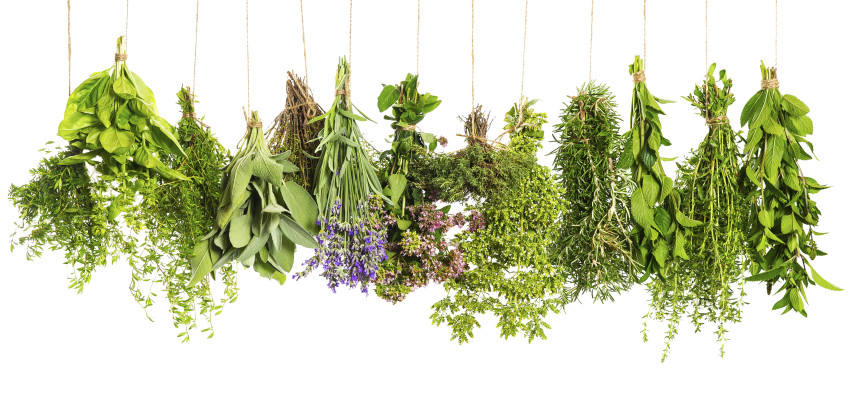By Leah Fliter on February 16, 2016
Add a little zing!
Herbs are an easy way to add zest when cooking

If you're like me, you have an entire drawer of spices, but no idea how to use them. Not only are herbs and spices a low-calorie way to add zest to your meal, they also have an array of health benefits. Try these 10 easy-to-use
herbs and spices in your upcoming meals.
1) Basil
Health benefits: Anti-inflammatory and antibacterial characteristics. It's also a rich source of magnesium.
How to use it: This popular Italian seasoning is great in pesto, on white meats, combined with fruit (such as raspberries
and strawberries), or added in stir-fries. Just remember to add it at the end — cooking it ruins the flavor.
2) Dill
Health benefits: Contains iron and calcium.
How to use it: This aromatic herb is best with salmon, added in borscht or other stews, on a variety of vegetables (especially carrots and cucumbers) and even mixed with yogurt.
3) Parsley
Health benefits: Contains vitamins K, C and A, and hearthealthy folate.
How to use it: This versatile spice is great in pasta dishes, sprinkled on fish and chicken or added to potatoes.
4) Sage
Health benefits: Contains acids that function as antioxidants. And the term "wise sage" may have some truth — research suggests it may be a memory enhancer.
How to use it: Sage is great with sweet fruits and veggies, like apples and squash, but it also adds a punch to sausage and
a variety of cheeses. And don't worry about overcooking — this powerful spice's flavor holds up well when cooked for long
periods of time.
5) Cayenne Pepper
Health benefits: Contains vitamin A and may help reduce cholesterol.
How to use it: Sparingly. Its hot and spicy flavor is great in vinegar-based sauces, can be combined with lemons in
marinades and works well with all types of meat.
6) Rosemary
Health benefits: Contains fiber, iron and calcium. It may also increase circulation and improve
digestion.
How to use it: Its woodsy flavor works well with a variety of roasted meats (like chicken, pork and salmon) or mixed into sauces for a more subtle taste. It also blends well with tomatoes, spinach and mushrooms.
7) Cilantro
Health benefits: A good source of fiber, iron and disease-fighting phytonutrients.
How to use it: Taken from the same plant as coriander seeds, cilantro has a slightly citrus taste. It is best in salsa, guacamole and combined with lemon and lime for marinades.
8) Thyme
Health benefits: Two teaspoons contain more than half your dietary reference intake (DRI) of vitamin K, and it protects cell membranes.
How to use it: Add it to bean, egg and veggie dishes. If you're a meat-lover, try it with lamb. It blends well with bay seasoning and parsley.
9) Coriander Seeds
Health benefits: May help control blood sugar, cholesterol and free radical production.
How to use it: Coming from the same plant as cilantro, these seeds are great added to soups, fish and smoked meats like
turkey. It blends well with cumin.
10) Turmeric
Health benefits: Good source of manganese, iron and vitamin B6.
How to use it: This colorful spice is most commonly used in curries, but it adds flavor to stirfried veggies or rice.
Source: www.health.com
Looking for other tips when cooking with herbs? Go here.


